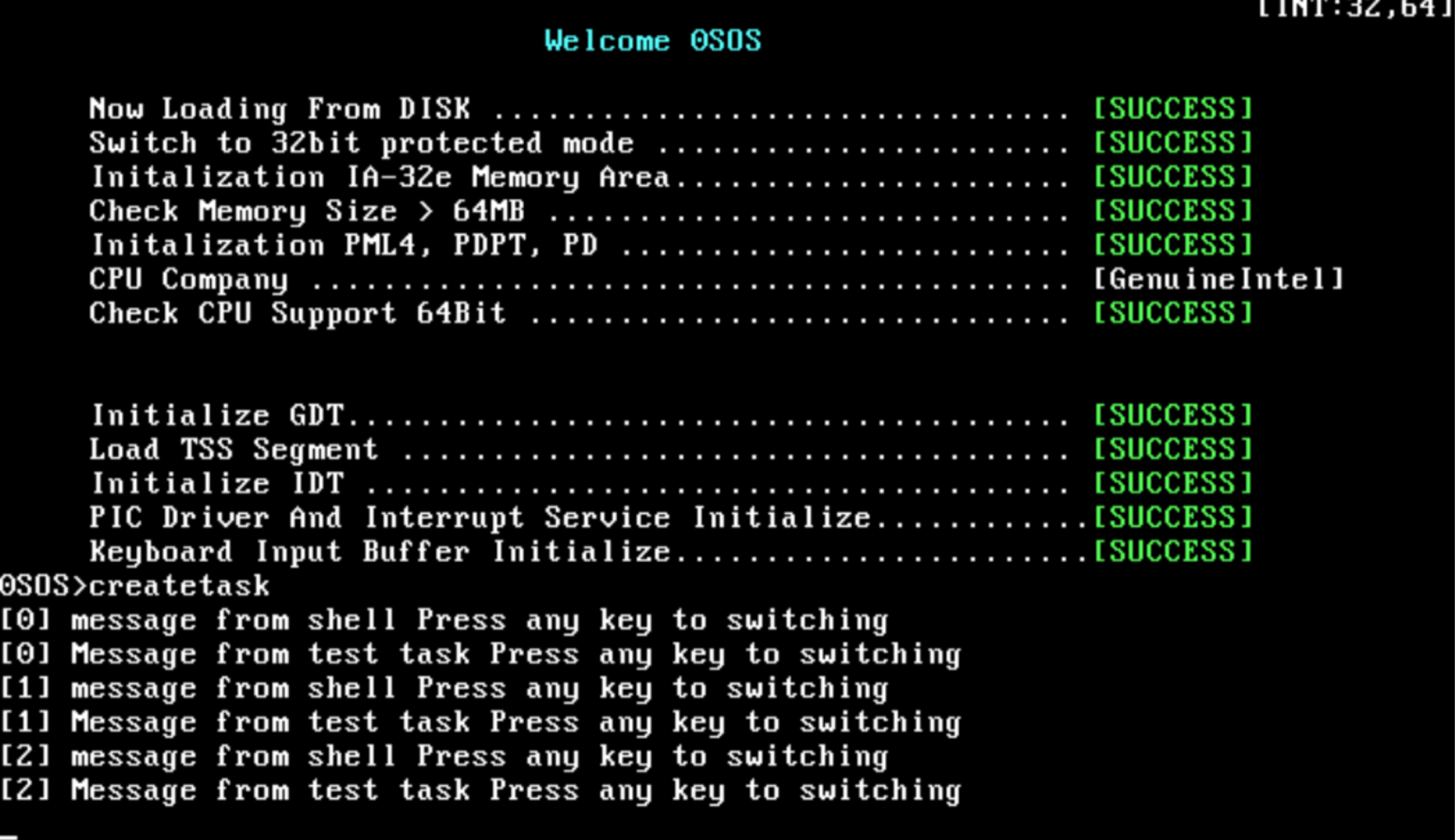Before I named the data structure ‘Universal Data Structure’ shortly ‘UDS’, I think General is more properly instead of Universal.
So I changed UDS to GDS.
I implemented Context Switching and Task for multitasking that was not yet supported.
It doesn’t look massive. But It is task switching definitely.

Before we define “Task” we need to check out about Context.
This Context, it was leaned OS in college.
It’s Process and Task’s executed status.
Context is just Register stored values and Stack.
Context Switching is literally switching, that would execute here and there.
The task is work that can be processed separately.
In Task, Code and Data can be shared but Stack and Context keep separation.
Latency time will be increased when you use timeslice instead of the batch process.
So I’ll use Timeslice multitasking.
Timeslice multitasking is context switching every millisecond by IRQ0 interrupt.
//shell.c
static TCB g_task[2] = {0.};
static QWORD test_stack[1024] = {0,};
void TaskTask()
{
int iteration = 0;
while(1)
{
_Printf("[%d] Message from test task Press any key to switching\n",iteration++);
_GetCh();
ContextSwitch(&g_task[1].Context, &g_task[0].Context);
}
}
void Command_CreateTask(const char* _Parameter)
{
KEYDATA key;
InitTask(&g_task[1],1,0, TaskTask, test_stack, sizeof(test_stack));
int iteration = 0;
while(1)
{
_Printf("[%d] message from shell Press any key to switching\n", iteration++);
if(_GetCh() =='q')
break;
ContextSwitch(&g_task[0].Context, &g_task[1].Context);
}
}
CreatTask function, it works for the creation of task and initialization.
Context Switching, switching context function.
Task Control Block, it is data-structure for context.
And Defining offsets and context.
I created Directory “Tasking”
Tasking/Task.h:
#ifndef __TASK_H__
#define __TASK_H__
#include <Types.h>
//SS, RSP, RFLAGS, CS, RIP.. Context
#define CONTEXT_REGISTER_COUNT 25
#define CONTEXT_REGISTER_SIZE 8
#define CONTEXT_OFFSET_GS 0
#define CONTEXT_OFFSET_FS 1
#define CONTEXT_OFFSET_ES 2
#define CONTEXT_OFFSET_DS 3
#define CONTEXT_OFFSET_R15 4
#define CONTEXT_OFFSET_R14 5
#define CONTEXT_OFFSET_R13 6
#define CONTEXT_OFFSET_R12 7
#define CONTEXT_OFFSET_R11 8
#define CONTEXT_OFFSET_R10 9
#define CONTEXT_OFFSET_R9 10
#define CONTEXT_OFFSET_R8 11
#define CONTEXT_OFFSET_RSI 12
#define CONTEXT_OFFSET_RDI 13
#define CONTEXT_OFFSET_RDX 14
#define CONTEXT_OFFSET_RCX 15
#define CONTEXT_OFFSET_RBX 16
#define CONTEXT_OFFSET_RAX 17
#define CONTEXT_OFFSET_RBP 18
#define CONTEXT_OFFSET_RIP 19
#define CONTEXT_OFFSET_CS 20
#define CONTEXT_OFFSET_RFLAG 21
#define CONTEXT_OFFSET_RSP 22
#define CONTEXT_OFFSET_SS 23
#pragma pack(push,1)
typedef struct __CONTEXT_STRUCT
{
QWORD Registers[CONTEXT_REGISTER_COUNT];
} CONTEXT;
typedef struct __TCB_STRUCT
{
CONTEXT Context;
QWORD ID;
QWORD Flags;
void* StackAddress;
QWORD StackSize;
} TCB;
#pragma pack(pop)
void InitTask(TCB* _Tcb, QWORD _ID, QWORD _Flags, QWORD _EntryPointAddress, void* _StackAddress, QWORD _StackSize);
//Link Assembly File
void ContextSwitch(CONTEXT* _CurrentContext, CONTEXT* _NextContext);
#endif /*__TASK_H__*/
It has many definitions, but there are just index and registers.
It’ll be great for statically assigning value in the array.
And than Context (It is just register-values)
And TCB (It can be Task Control Block and Thread Control Block)
TCB contain Context, ID, Flags, Stack Address, and Stack size
Tasing/Task.c:
#include "Task.h"
#include <Utility/Memory.h>
#include <Descriptor/GDT.h>
void InitTask(TCB* _Tcb, QWORD _ID, QWORD _Flags, QWORD _EntryPointAddress, void* _StackAddress, QWORD _StackSize)
{
_MemSet(_Tcb->Context.Registers, 0, sizeof(_Tcb->Context.Registers));
//초기화 과정의 RSP, RBP 해당 Task의 Stack Pointer 기 떄문에 + Size
_Tcb->Context.Registers[CONTEXT_OFFSET_RSP] = (QWORD)_StackAddress + _StackSize;
_Tcb->Context.Registers[CONTEXT_OFFSET_RBP] = (QWORD)_StackAddress + _StackSize;
//Segment Register Setup in Context
_Tcb->Context.Registers[CONTEXT_OFFSET_CS] = GDT_KERNEL_CODE_SEGMENT;
_Tcb->Context.Registers[CONTEXT_OFFSET_DS] = GDT_KERNEL_DATA_SEGMENT;
_Tcb->Context.Registers[CONTEXT_OFFSET_ES] = GDT_KERNEL_DATA_SEGMENT;
_Tcb->Context.Registers[CONTEXT_OFFSET_FS] = GDT_KERNEL_DATA_SEGMENT;
_Tcb->Context.Registers[CONTEXT_OFFSET_GS] = GDT_KERNEL_DATA_SEGMENT;
_Tcb->Context.Registers[CONTEXT_OFFSET_SS] = GDT_KERNEL_DATA_SEGMENT;
//Next run instruction setup
_Tcb->Context.Registers[CONTEXT_OFFSET_RIP] = _EntryPointAddress;
// 0 NT IOPL OF DF IF TF SF ZF 0 AF 0 PF 1 CF
// 0 0 0 0 0 0 1 0 0 0 0 0 0 0 0 0
_Tcb->Context.Registers[CONTEXT_OFFSET_RFLAG] |= 0x0200;
//Setup TCB Block
_Tcb->ID = _ID;
_Tcb->StackAddress = _StackAddress;
_Tcb->StackSize = _StackSize;
_Tcb->Flags = _Flags;
}
It is just function for the initialize of members.
Segment register kernel segment and initialize register’s initial values.
And next code of execution assigns in RIP register(PC, Program counter)’s EntryPoint.
And ContextSwitch function linked with assembly code.
[BITS 64]
global ContextSwitch
SECTION .text
%macro SAVECONTEXT 0
push rbp
push rax
push rbx
push rcx
push rdx
push rdi
push rsi
push r8
push r9
push r10
push r11
push r12
push r13
push r14
push r15
mov ax, ds
push rax
mov ax, es
push rax
push fs
push gs
mov ax, 0x10
mov ds,ax
mov es,ax
mov gs,ax
mov fs,ax
%endmacro
%macro LOADCONTEXT 0
pop gs
pop fs
pop rax
mov es, ax
pop rax
mov ds, ax
pop r15
pop r14
pop r13
pop r12
pop r11
pop r10
pop r9
pop r8
pop rsi
pop rdi
pop rdx
pop rcx
pop rbx
pop rax
pop rbp
%endmacro
ContextSwitch:
push rbp
mov rbp, rsp
;Push RFLAGS in stack
pushfq
;if _CurrentContext is NULL
cmp rdi,0
je .LoadContext
popfq
push rax ;For use Context Offset
;Save SS RSP RFLAGS CS RIP Registers
mov ax, ss
mov qword[rdi + 23 * 8], rax
mov rax, rbp
;reset value to before, RSP Contextswitch -(ReturnAddress + RBP)
add rax, 16
mov qword[rdi + 22 * 8], rax
;Push FLAGS in stack
pushfq
pop rax
mov qword[rdi + 21 * 8], rax
;Save Cs Segment
mov ax, cs
mov qword[rdi + 20 * 8], rax
mov rax, qword[rbp + 8]
mov qword[rdi + 19 * 8], rax
pop rax
pop rbp
;Context->Registers
add rdi, 19*8
mov rsp, rdi
sub rdi, 19*8
SAVECONTEXT
.LoadContext:
mov rsp, rsi
LOADCONTEXT
iretq
If the first parameter Null(0) it is ShellTask.
Jump to .LoadContext
If working like that, We will context load by the second parameter.
If not, it would save context.
And then load by the second parameter.
So It’s done of context-switching.
Huh.
